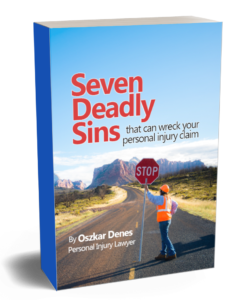Claiming compensation for injuries in public places
Many personal injury claims relate to incidents which occur in public places. We have experience in representing clients in a range of different scenarios, including for example:
- slip and fall and trip and fall
- incidents in pubs/hotels
- injuries in shopping centres and carparks
- incidents in amusement parks, day trip events and at sporting/entertainment events or venues
Slip and falls and trip and falls
In Queensland, an occupier of a property must take reasonable steps to ensure that the property is safe for people to access and use. This is called duty of care. This includes local councils in respect of public places that they are responsible for, such as parks, footpaths and so on. If your accident happened because the owner of the property (or the local council) did not discharge their duty of care, then you can claim compensation for any loss you have suffered.
Sometimes it is immediately obvious that the property owner was negligent. In other cases, it’s necessary to undertake thorough investigations to determine who is the responsible party. For example, it may not be obvious whether a particular section of the footpath is owned by a shopping centre (i.e. it’s private property) or it is owned by council. Appropriate property searches must be carried out in such a situation.
Pubs and hotels
Pubs and hotels owe a duty of care to patrons. One common situation which gives rise to claims is when a pub allows patrons to get intoxicated who then become aggressive and physically assault other patrons. Another example is when hotel security uses excessive force against patrons. A third example is a situation where a hotel doesn’t keep its floor surface safe, it allows spillages uncleaned and people hurt themselves on the slippery surface.
One of the key aspects in a claim against pubs and hotels is to determine which party or parties bear responsibility for the incident. Often the hotel is run under license (meaning the hotel owner is not the same as the licensee) and security is usually (though not always) subcontracted. When representing injured clients we always ensure every party who may face responsibility is joined in the action, to maximise compensation to our clients.
Shopping centres and carparks
Some examples of the types of cases we have dealt with in shopping centres and carparks include:
- Defective design of carpark shade sails. A supporting post was a hidden hazard causing injury to a client who had finished shopping.
- Improperly installed cooler door in grocery store falling on client, causing nerve damage.
- Inadequate system of cleaning allowing wet floor surface unattended for over an hour, leading to slip and fall accident to elderly shopper.
Amusement parks, day trip events and sporting venues
In recent years there have been a number of high profile incidents at some of Australia’s best known amusement parks. But serious incidents do occur at a wide range of locations or events. A critical issue in these cases is that venues and service providers will almost always make you sign a waiver to prevent you from claiming compensation. Despite a waiver, in many cases we can still claim compensation for our clients and we have written an article about this. And just to mention a few examples we have dealt with:
- Failing zipline in an adventure park, causing serious injury.
- Personal injury during a snorkeling daytrip in Far North Queensland, on the vessel on the way to snorkeling.
- Equipment failure at holiday resort.
- Personal injury on a golf course.
Free book offer: what to expect in your injury claim
Many firms try to rush you to sign up with them without carefully considering your options. We encourage you to first learn about your personal injury claim. You should ask yourself:
- How do you calculate your compensation amount?
- How should you choose your lawyer? Do you just choose by firm name regardless of who is really in charge of your matter? Has your lawyer ever argued a case in court?
- What is a no win – no fee agreement? How much will it cost?
Our book is available to you free of charge. You don’t have to be a client to receive this book. Head to the order page and we will be happy to send you a copy straight away.
25% cap on legal costs
In all of our personal injury compensation matters, we act on a No Win – No Fee basis. What that means is, there’s no upfront cost to you.
In Queensland, most compensation firms will charge you 50% of your compensation amount – the maximum allowed at law. This is very expensive. Our fee is different. We will cap our fee at 25% . Remember also, these are the maximum fees we will charge. If our fee in your claim is less, then we charge the lesser amount.
Before you engage us, we will provide you a written Disclosure Notice and a Client Service Agreement. These documents set out in detail the service we provide, as well as our fees and outlays. Before you sign anything, you can take these documents home with you, and study them with your family. You can take as long as you need, there is never any pressure from us. If anything in these documents doesn’t make sense to you, we can discuss it with you and you are free to ask another lawyer to give you advice. And remember, no win – no fee agreements come with a 5 day cooling off period for extra peace of mind.

